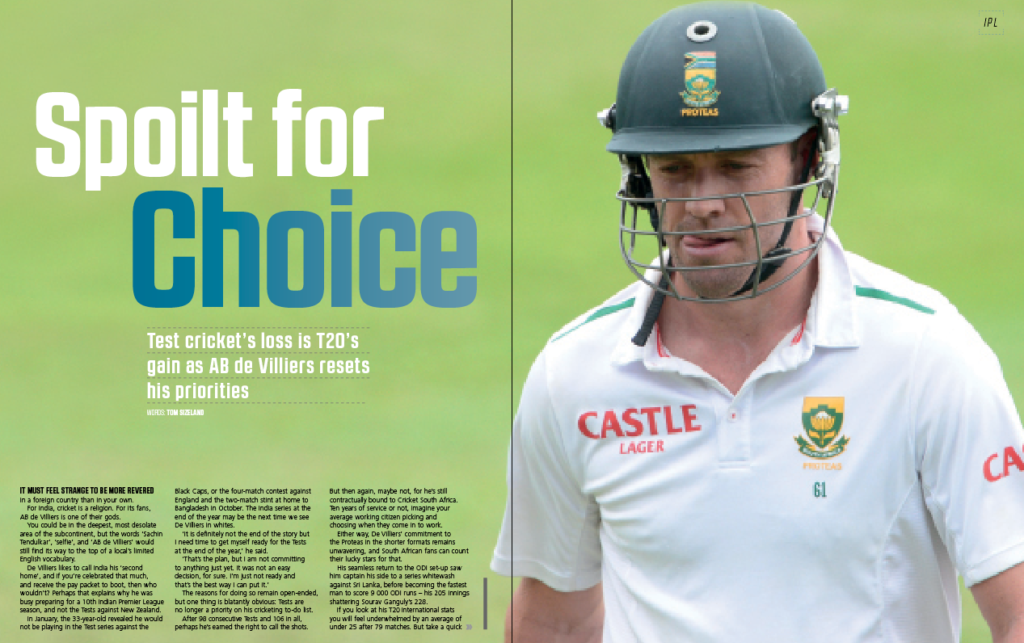Test cricket’s loss is T20’s gain as AB de Villiers resets his priorities, featured in the latest edition of SA Cricket magazine.
It must feel strange to be more revered in a country than your own.
For India, cricket is a religion. For its fans, AB de Villiers is one of their gods.
You could be in the deepest, most desolate area of the subcontinent, but the words ‘Sachin Tendulkar’, ‘selfie’, and ‘AB de Villiers’ would still find its way to the top of a local’s limited English vocabulary.
De Villiers likes to call India his ‘second home’, and if you’re celebrated that much, and receive the pay packet to boot, then who wouldn’t? Perhaps that explains why, at the time of writing, he’s busy preparing for the 10th Indian Premier League season, and not the Test series against New Zealand.
In January, the 33-year-old revealed he will not be playing in the Test series against the Black Caps, as well as the four-match contest against England, nor the two-match stint at home to Bangladesh in October. The India series at the end of the year may, or may not be, the next time we see De Villiers in whites.
‘It is definitely not the end of the story, but I need time to get myself ready for the tests at the end of the year,’ he said.
‘That’s the plan, but I am not committing to anything just yet.
‘It was not an easy decision for sure. I’m just not ready and that’s the best way I can put it.’
The reasons for doing so remain open-ended, but one thing is blatantly obvious: Tests are no longer a priority on his cricketing to-do list.
After 98 consecutive Tests and 106 in all, perhaps he’s earned the right to call the shots. But then again maybe not, for he’s still contractually bound to Cricket South Africa. Ten years of service or not, imagine your average working citizen picking and choosing when they come in to work?
Either way, his commitment to the Proteas in the shorter formats remains unwavering, and South African fans can count their lucky stars for that.
His seamless return to the ODI setup saw him captain his side to a series whitewash against Sri Lanka, before becoming the fastest man to score 9 000 ODI runs – his 205 innings shattering Sourav Ganguly’s 228.
If you take a look at his T20 International stats, you will feel underwhelmed with an average of under 25 after 79 matches. But take a quick glance at his IPL numbers, and you can understand just why he feels so at home there.
In 120 matches for the Delhi Daredevils and the Royal Challengers Bangalore, De Villiers has amassed 3 257 runs at an average of 39.24 and a strike rate of 149.33. He’s scored the ninth-most runs in the history of the tournament. In the top 50, his average is bettered only by Chris Gayle and Shaun Marsh. Gayle and Virender Sehwag are the only ones who boast meaner strike rates.
It’s phenomenal reading, and he plays for a phenomenal team. On paper at least. RCB are littered with high-profile players, from the likes of batting giants Gayle and Virat Kohli, to Australian all-rounder Shane Watson. The absence of Mitchell Starc means they’ve forked out an unbelievable R23.3-million on left-arm paceman and England T20 specialist Tymal Mills.
Last season the side went on a rampaging run, which saw Kohli strike no less than four centuries as they won five matches in a row to reach the final. But, in true RCB fashion, they lost their third IPL final, this time to the Sunrisers Hyderabad. It was an all too familiar situation for De Villiers, who scored five in that match to miss out on silverware that he so often collects for the Proteas.
That’s not to take anything away from his value to the side, finishing third in the run-scoring charts last season. His proud reputation in Bangalore will be examined once again, with the expectation that his side should lift the trophy for the first time in their history.
As ever, a whole host of countrymen will be joining him, but one man, inexplicably, won’t.
Imran Tahir, the No 1 ODI and T20 bowler in the world, was released by the Delhi Daredevils. The Proteas players could miss as many as four matches this season. Perhaps age, his last season’s form, or lack of impact with the willow could be contributing factors towards his unceremonious dumping.
But the IPL auction continues to prove how fickle the bidders are, as they too often wave their paddles towards a ‘flavour of the month’, ‘you’re only as good as your last game’ approach. Tahir received no bids at the meat market, despite having a base price a tenth of what Kagiso Rabada ended up going for.
Overnight millionaire Mills has only played three T20 Internationals, but he played them a few weeks before the auction, and he played them in India. It’s all about timing.
The Proteas’ early departure for their tour of England has left the likes of Andile Phehlukwayo, Wayne Parnell, Lungi Ngidi and Farhaan Behardien wondering if things could have gone differently had they been available for the entirety of the tournament.
There are no such issues for JP Duminy, Quinton de Kock and Chris Morris, as the South African flavour continues to linger in the nation’s capital, with Rabada joining them at the Delhi Daredevils.
A few players will feel they have a point to prove this term. David Miller needs a dramatically better tournament than the last one, which saw him stripped of the captaincy after averaging 16.10 with the bat, while the Rising Pune Supergiants’ Faf du Plessis will want to translate his international form into IPL success, after a relatively long history of fleeting moments of success for his franchises.
A number of the Saffas will have a big role to play in their country’s very own T20 competition, the inaugural Global T20 Destination League, which is set to get under way at the end of the year. De Villiers may not be involved in the five-day format for his country, but he will be expected to be an ambassador getting this event of its feet.
The Caribbean Premier League is not on De Villiers’ schedule this year, but the man has his hands full, and it’s only a matter of time before he joins the likes of Brendon McCullum, Kevin Pietersen and Gayle in turning into a full-time freelancer.
‘My priorities have changed over the years,’ he admitted to the media after announcing his Test hiatus. ‘I have played for over 12-odd years, family has changed, my roles in the team have changed over the years and there are a lot of things that have played a role in this decision.
‘I wouldn’t like to think it’s the end. I would like to make a comeback and finish what I have started.’
De Villiers has a second child on the way; family comes first. With that comes the need for financial security and to make hay while the sun shines. It’s believed that some of the players earn as much as $150 000 per match in the IPL. That’s a staggering amount of money, and when they’re told that they have to miss the tail-end of the tournament to participate in a team-building camp for their country, they start to jot down the pros and cons.
We’ve seen a number of South African players, notably Rilee Rossouw and Kyle Abbott, sign Kolpak contracts which has freed their cricketing schedules to play in different leagues around the world, where they will undoubtedly earn more money.
The more patriotic fans might find this harder to comprehend, but who would begrudge a player looking to turn their careers into more lucrative ones? This might well be the path De Villiers is choosing, and after almost 300 international caps across the formats, he can proudly say he’s done his time.







